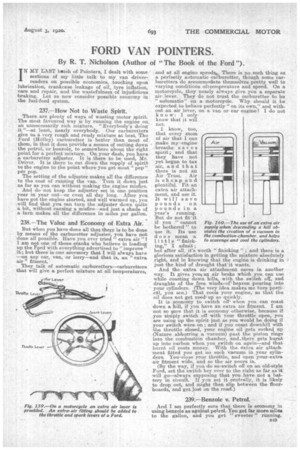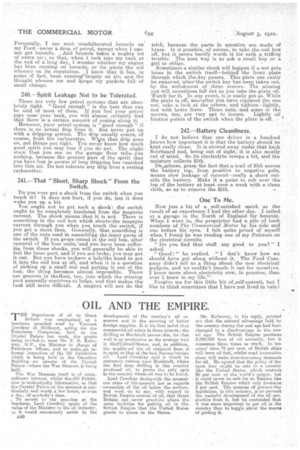• FORD VAN POINTERS.
Page 27

Page 28

If you've noticed an error in this article please click here to report it so we can fix it.
By R. T. Nicholson (Author of "The Book of the Ford ").
IN MY LAST bitch of Pointers, I dealt with some sections of my little talk to my. van driverreaders on possible economics, touching upon lubrication, crankcase leakage of oil, tyre inflation, care and repair, and the wastefulness of injudicious braking. Let us now consider possible economy in the fuel-feed system.
237.—How Not to Waste Spirit.
There are plenty of ways of wasting motor spirit. The most favoured way is by running the engine on. an unnecessarily rich mixture. "Everybody's doing it "—at least, nearly everybody. Our carburetters give us a very rough and ready mixture at best. The Ford (Holley) carburetter is better than most of them, in that it does provide a means of cutting down the petrol, or benzole, to somewhere about the right point for a perfect mixture.On your dash, you have a carburetter adjuster. It is there to be used, Mr. Driver. It is there to cut down the supply of spirit to the engine to the point where you get most " pep" per pop.
The setting of the adjuster makes all the difference to the cost of running the van. Turn it down just as far as you can without making the engine misfire. And do not keep the adjuster set in one position year in year out—or even all day long. After you have got the engine started, and well warmed up, you swill find that you can turn the adjuster down quite a bit, without oa,using a misfire—and just a shade of a turn makes all the difference in miles per gallon. . 238.—The Value and Economy of Extra Air.
But when you have done all that there is to be done by means of the carburetter adjuster, you have not done all possible. Have you ever tried" extra air "1 I am not one of those cranks who believe in loading up the Fprd with everything advertised to "improve" it ; but there is one accessory that I will always have —on any car, van, or lorry—and that is, an "extra air" fitment. .
• They talk of automatic carburetters—carburetters that will give a perfect mixture at all temperatures, and at all engine speeds. There is no such thing as a perfectly automatic carburetter, though some carburetters do accommodate themselves pretty well to varying conditions ofttemperature and speed. On a motorcycle, they nearly always give you a separate air, lever. They do not trust the carburetter to be " automatio" on a motorcyele. Why should it be expected to behave perfectly "on its own," and without an air lever, on a van or car engine'? I do not know: I only know that it will not.
I know, too, that every atom of air that I can make my engine breathe saves spirit; and that they have not yet begun to tax air, and that there is not an Air 'Trust. . Air is cheap and plentiful. Fit an extra air attachment, and use it. It will save pounds on pounds in a year's running. But do not fit-it if you " cannot 'be bothered " to use it. Its use does mean a, little "finicking," I admit ; but after all, it's worth " finicking " ; and there is a glorious satisfaction in getting the mixture absolutely right, and in knowing that the engine is drinking in just the kind of draught thata wants. And the extra air attachment saves in another way.. It gives you* an air brake which you can use while coasting down hills, with the switch off, and draughts of the free winds-tor heaven pouring into your cylinders. (The very idea makes me turn poetioil, you see.) That cools your engine, so that the oil does not get used; up so quickly. It is economy to switch off' when you can coast down a hill if you have an extra air fitment. I am not so pre that it is economy otherwise, because if you simply switch off with your throttle open, you are using up the spirit just as you would be doing if your switch were on ; and if you coast downhill with the throttle closed, your engine oil gets sucked up (Nature abhorring a vacuum) past the piston rings into the combustion chamber, and,there gets burnt up into carbon when you switch on again—and that burnt oil costs money. With the. extra. air attachment fitted you get no such vacuum in your cylinders. low-close your throttle, and open your extra air fitment wide, and so the air pours in. (By the way, if you do ,s.cnswitch off on an old-style Ford, set the switch key over to the right as fax asit will go—always supposing that you have not a bat
tery in circuit. If you set it centrally, it is likely to drop out, and might then slip between the floorboards, and get Jost on the road.) Fig. 160.—The use of an extra air supply when descending a hill obviates the creation of a vacuum in the combustion-chamber, and helps to scavenge and cool the cylinders.
239.—Benzole v. Petrol.
And I am perfectly sure that there is economy in using benzole as against petrol. You get far more miles to the gallon, and you get " sweeter " running. B49
Personally, I • use neat unadulterated benzole on my Ford—never a drop of petrol, except when I cannot get benzole. And benzole takes a mighty lot of extra air ; so that, when I look into my tank at the end of a long day, I wonder whether my engine has Veen running on benzole, or (to quote the old wheeze) on its reputation. I know that it has, in point of fact, been runninelargely on air, and, the thought pleases me and keeps my pockets full of small change. •
240..—Spirit Leakage Not to be Tolerated.
There are very few petrol. systems that are absolutely tight. "Good enough" is the best that can be said of most of diem. If you feel your petrol pipe near your tank, you will almost .-iertainly find that there is a certain amount of oozing along it. However, your petrol system is "good enough" if there is no actual drip from it. But never rput up with a dripping system. The drip usually comes, of course, from the carburetter. WIrn that drip goes on, get things put right. You never know how much good,spirit you may lose if you do not. The slight stain that you see on the garage floor tells, you nothing, because the greater part of the spirit that you have lost in qourse of long dripping has vanished into thin air. Do not tolerate any drip from a resting carburetter.
241.—That "Short, Sharp Shock" From the Switch.
Do you ever get a shock from the switch when you touch it? It does not hurt, if you do, but it does wake you up a bit.
You ought not to get such a shock: the switch ought to be completely insulated from the magneto current. The shock means, that it is not. There is something in the coil box which shortsothe magneto current through you when you touch the .switch, if you get a short then. Generally, that something is one of the nuts used in assembling theInner parts of the switch. If you grope round in the coil box, after removal ef the four units,"and you have been suffering from these shocks, you will generally be able to feel the loose part, and if you axe-lucky, you may get it out. But you have toshave a. ladylike hand to get it into the coil box at all, and when it is a question of picking up a small nut and getting it out of the box-, the thing becomes almost impossible. There are grooves in the4box, too, into which the missing part generally contrives to lodge, and that makes thq task still more difficult. A magnet will not do thIS
trick, because the parts in question are made of brass. It is possible, of course, to take the coil box off, but it seems hardly worth it for such a trifling trouble. The best way is to ask a small boy or a girl to oblige. Sometimes a similar shock will happen if a nut gets loose in the switch itself—behind' the front plate through which thekey passes. This plate can easily be removed, afterthe switch key has been taken out, by the withdrawal of „three screws.. The missing nut will sometimes fall out as you take the plate oft. Watch for it. In any event, it is easily got at. While the paate is off, ami?after you have replaced the one nut, take a look at the others, and tighten—lightly, not with brute fOrce. These nuts, and some of the
screws, too, are very apt to loosen. Lightly oil . friction points of the switch when the plate is off.
242.—Battery Cleanliness.
I do not believe that one .driver in a hundred knows how important it is that the battery should be kept really clean. It is stowed away under that back floorboard and, being out of sight, it is also mostly out of mind. So its electrolyte creeps a bit, and the moisture collects filth.
Dooplease, grasp the fact that a trail of filth acrosa the battery top, from positive to negative pole, means slow leakage of current—really a short outside the battery. Make it a point to rub over the top of the battery at least once a week with a clean -cloth, so as to remove the filth.
One To Me.
Now just a bit of a self-satisfied smirk as the result of 821 experience I had the other day. I called at a, garage in the North of England for benzole. When I went in, the proprietor had a pile of back numbers of The Commercial Motor by his side and one before his eyes. I felt quite proud of myself when I found he was reading one of my Pointers on the electrical circuits.
"Do you fmd that stuff any good to youl " I asked.
" Good!" he replied. "I don't know how we should have got along without it. The Ford Company didn't tell us a thing about the new electrical gadgets, and we couldn't puzzle it out for ourselves. I know more about electricity new, in practice, than ever I knew in my life." Forgive me for this little bit of,self-conceit, but I like to think sometimes that I have not lived in vain!






























